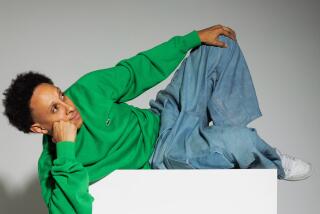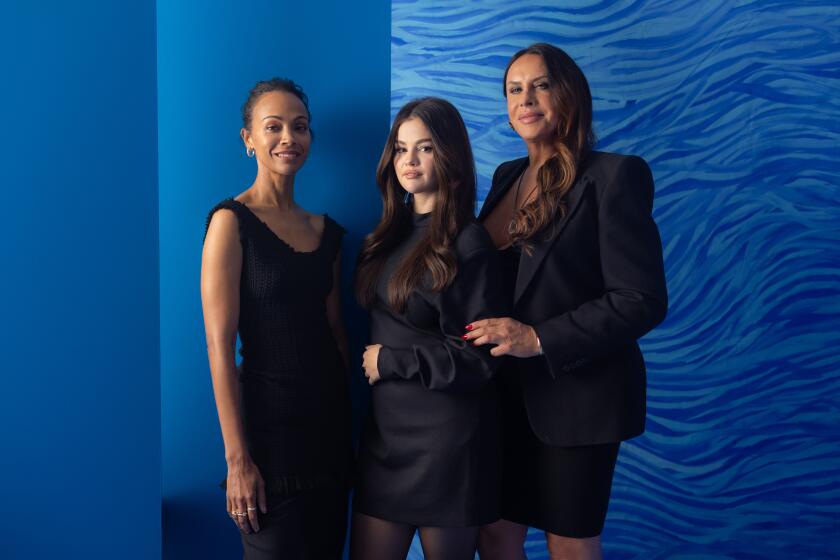Jessica Chastain is leading the charge for a new kind of Hollywood, both on-screen and off
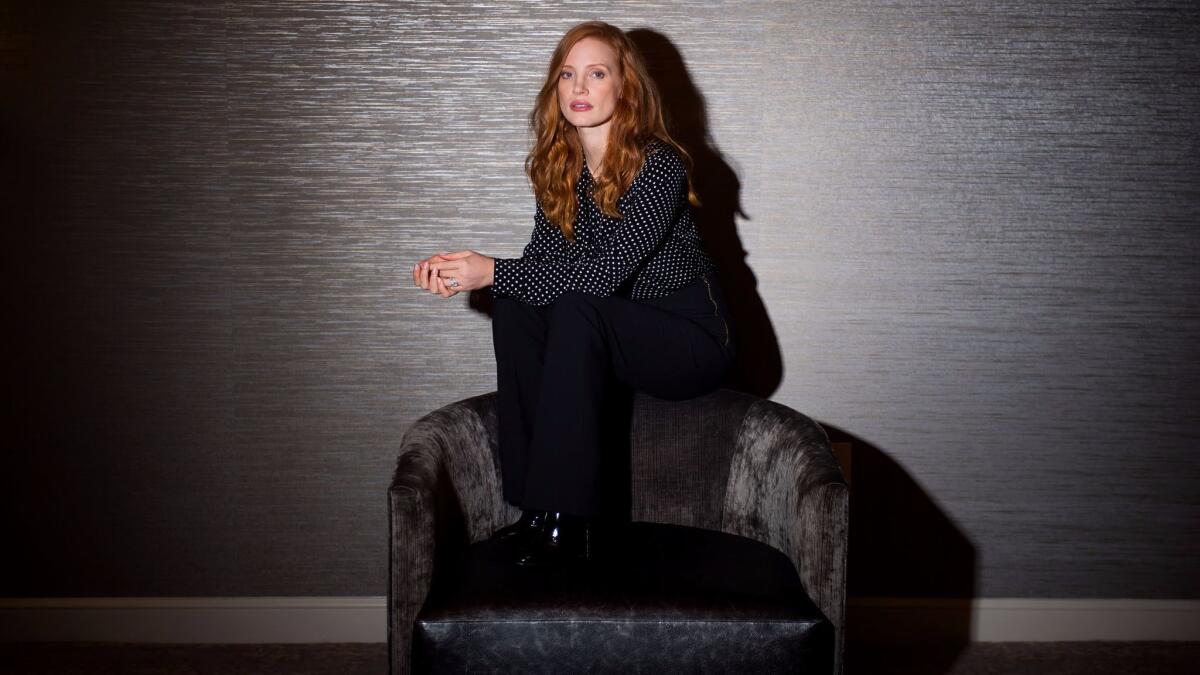
Jessica Chastain isn’t sure how much she wants to act anymore. She’s not retiring or anything, not yet — she’s just not as passionate about the job as she used to be.
“I’m more interested in the idea of making the world a better place,” she says. “In thinking about ‘What am I contributing to the world?,’ my passions keep shifting away from myself.”
Coming from most Hollywood stars, this would probably just sound like sanctimonious garbage. But Chastain, 40, has taken action that actually backs up her words.
Over the last year, the actress has made about as many headlines for being outspoken on Twitter as she has for her film roles. Alongside Rose McGowan, Amber Tamblyn, Lena Dunham and Olivia Munn, Chastain has become one of the industry’s most vocal feminists, sharing her thoughts on gender equality and sexual harassment with her 650,000 followers.

Jessica Chastain and Idris Elba star in “Molly’s Game.”
This month, her feed has also been interspersed with promotional tweets about “Molly’s Game,” in which she plays Molly Bloom, the infamous “poker princess” who organized underground games frequented by the likes of Leonardo DiCaprio, Tobey Maguire and Ben Affleck until she was arrested by the FBI.
The film, out Dec. 25, was written by Aaron Sorkin and marks his directorial debut. It offers Chastain the sort of tour de force lead role actresses don’t often get in Hollywood. Surrounded by a supporting cast including Idris Elba and Kevin Costner, Chastain’s Bloom dominates the movie, with razor-sharp delivery of Sorkin’s rapid-fire dialogue narrating the entire journey.
Despite the strong critical attention for her performance — she’s up for a Golden Globe for her part in the movie next month — Chastain’s social media focus hasn’t really been on “Molly’s Game.” Instead, her aim on Twitter is to “amplify the voices” of women who have been victims of harassment — women, she said, who “have nothing to gain except to help other women.”
Even before the Harvey Weinstein scandal broke on Oct. 5, Chastain was sending out candid tweets about the problems she saw in the business. On Aug. 1, after CBS announced it had no fall shows with female leads, Chastain wrote: “I’ll just @netflix and chill. Or some @HBO greatness. ...There’s so many incredible options that don’t include @CBS.”
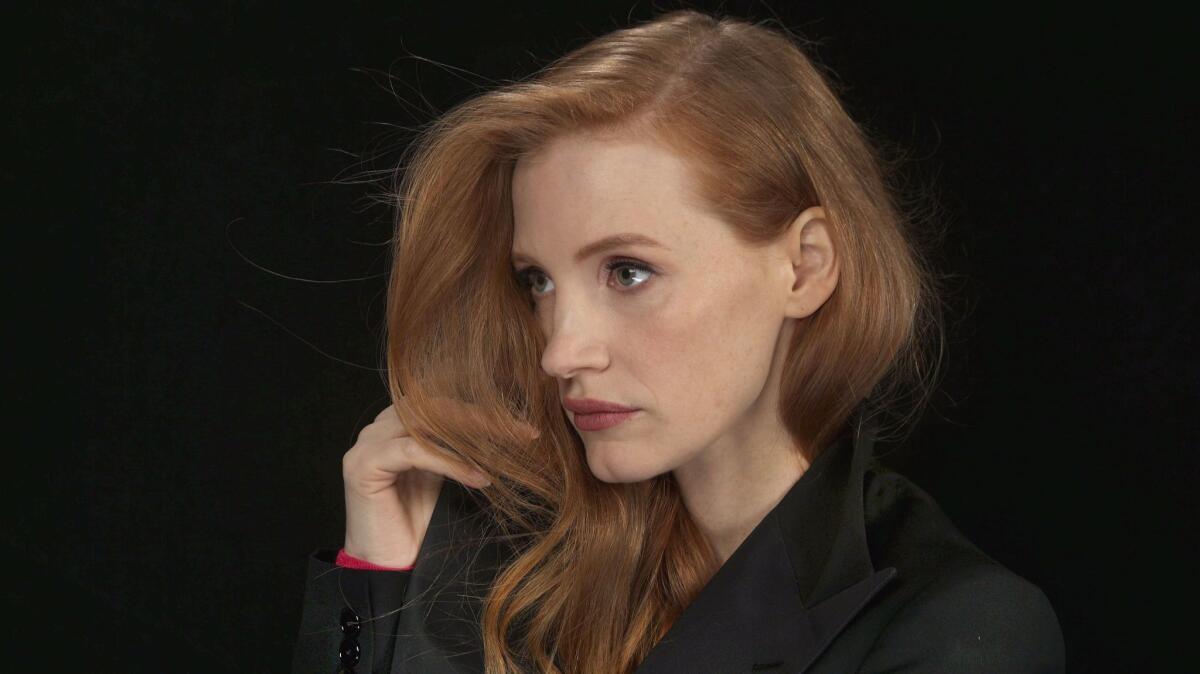
When the news hit about claims of sexual misconduct against Weinstein, she acknowledged that she’d been “warned from the beginning.” “YEP,” she tweeted a few weeks later after The Times wrote about alleged sexual misconduct by filmmaker Brett Ratner.
Soon, she began drawing attention to prior claims of sexual assault against director Bryan Singer — even though he is a producer on “X-Men: Dark Phoenix,” the upcoming comic book franchise installment that Chastain has a role in. (The actress later clarified that she “didn’t realize he was involved until recently” and said “he wasn’t on set.”)
“If [tweeting] puts an X on me in terms of ‘Oh, that’s it, she’s out of the industry,’ I don’t care,” Chastain said. “When the first article came out about Weinstein, I retweeted it, and immediately kept sharing stories. And then I got an e-mail from someone who was very successful in the industry who said I was using my social media platform irresponsibly. I got pushback.”
It was exactly this defiant nature that made Bloom feel Chastain was the right actress to bring her story to the big screen.

Actress Jessica Chastain found the portrayal of women in the films she saw at the Cannes film festival “really disturbing.”
“Obviously, she’s an extraordinary actress, but I am so moved by her moral courage and fearlessness when it comes to speaking out in a town that has traditionally not wanted women to,” said Bloom, 39, who has long since retired from the gambling circuit and now lives in Denver. “Of course, we wanted someone who was a formidable actress — but the fact that she’s also a real person with a real purpose and huge heart was a big win.”
Meeting Bloom for the first time at the Four Seasons in 2015, Chastain now acknowledges, she wasn’t quite as generous. She’d spent days Googling Bloom, sifting through salacious tabloid gossip and images of the well-manicured brunet wearing low-cut dresses.
“I’m going to be completely honest: I had a lot of judgment — and I have some shame and a little bit of embarrassment saying that,” Chastain said. “I Googled her and was like, ‘Look how she’s presenting herself in this world. I understand who this girl is.’”
Minutes into her sit-down with Bloom, Chastain realized she’d been unfair. She said she came to understand that Bloom was the product of a world that rewards and values women for being sexually desirable — and then when they are sexually desirable, “we go, ‘You can’t take her seriously, because look at her.’”
Soon, she started obsessing over the Kardashians — studying their contouring and eventually plastering their pictures all over her trailer. She even infiltrated an underground poker game in New York, where she saw a couple women wearing Herve Leger dresses, at the ready, she said, to provide massages for the male players.

“Molly’s Game” actress Jessica Chastain explains how researching for her role gave her “a lot of compassion for women in our society” for everything they have to go through just for “someone to listen to what they have to say.”
“I called Aaron the next day and said, ‘We need bandage dresses,’” Chastain recalled. “He said, ‘I have no idea what that is, but that sounds fine.’”
Actually putting on that bandage dress, however, affected Chastain in ways she hadn’t anticipated. Typically, the actress dresses relatively conservatively — on this day in November, she was wearing high-waisted pants and a bow-tie blouse. But walking onto set in skin-tight garments, Chastain said she felt a “rush of power,” noticing everyone’s eyes on her.
“And I knew why,” she said. “Someone showed me the comments on the trailer for this film, and there are so many comments about my cleavage. I’ve never done a movie where people have been talking about my body like that.”
The wardrobe also restricted her physically. She was almost always uncomfortable, worrying about leaning over and revealing too much.
“Sometimes I’d have to do an action and say, ‘I can’t do that because I’m in a plunging dress,’” she said. “You lose your ability to move in ways that are natural. I was wobbling in heels. I felt like I was giving something away — my own sense of freedom.”
As a novice director, Sorkin admitted, he had some initial hesitation about working with an actress who’d been directed by Terence Malick (“The Tree of Life”), Christopher Nolan (“Interstellar”) and Kathryn Bigelow (“Zero Dark Thirty”).
“Would she be taking direction from me, a first-time director, or would I be directed by her?” he said he asked himself. But after a brief meeting — during which Chastain bluntly told him that the perfunctory face-to-face was “stupid” and that he should “just give [her] the part” — Sorkin felt confident he’d found his Molly.
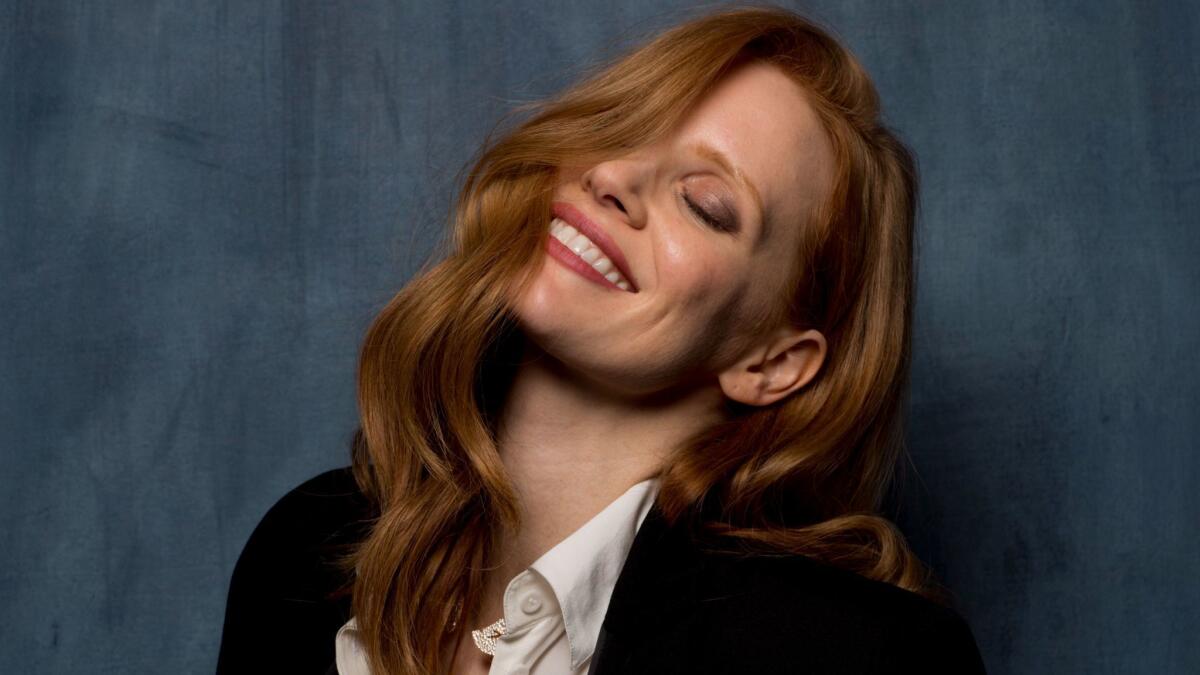
“By the time we got on set, we had talked so much that once the cameras started rolling, I would only have to step in between takes to give direction in five words or less — little hotter, faster, colder, slower,” the director said. “And the thrill of watching Jessica going from the first take to the second was extraordinary.
“On the first, she would do a wonderful job, and you’d think, ‘Wow, that’s good. We got it. Let’s get a second one for safety.’ And the second one was when she’d blow the doors off the room. Of course, because no good deed goes unpunished, the quality of the second would lead me to say, ‘Well, let’s definitely do a third.’”
Chastain studied at Juilliard, training paid for with a scholarship provided by Robin Williams. After graduating, she struggled to find work, until suddenly, at age 33, six long-gestating films she’d made were all released in the same year, including “The Help” and “Take Shelter.”
Because she came into the industry as a “fully formed adult,” Chastain said, she hasn’t been “victimized in the extreme ways” that many other actresses have recently revealed. Which isn’t to say that she hasn’t witnessed her fair share of inappropriate behavior.
When she first arrived in Hollywood, she said, she had a general meeting with an independent producer who spent the entire coffee outing lamenting how his wife “never gave him blow jobs anymore.” On set, male producers would jokingly smack her on the behind. Sometimes, her male costars would refuse to come out of their trailers, keeping the crew waiting as Chastain continued to meet her call times.
“In 2011, when I started to gain some heat in the industry, I was so excited,” she said, “but I felt this crippling fear that it was all going to be taken away from me if I said the wrong thing or offended the wrong person. But it was like, ‘I’m here, I’m being professional, so why am I afraid that if I say my opinion that I’m going to be denied my livelihood?”
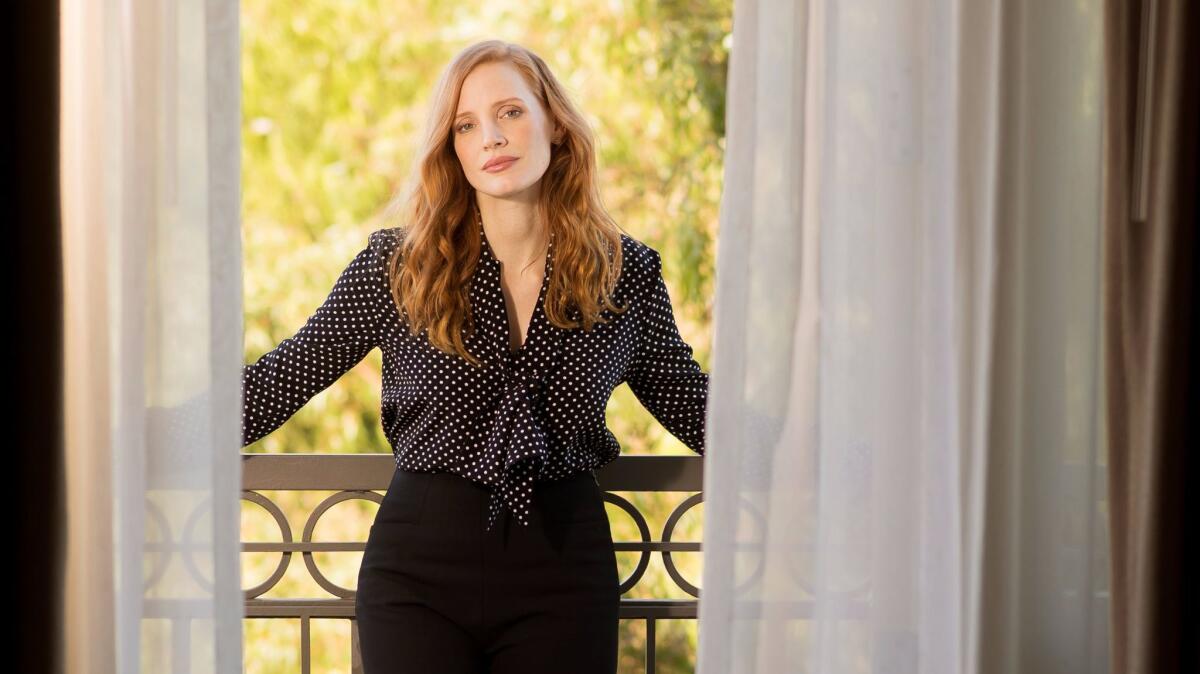
That changed in 2013, when a rumor circulated that Chastain had a rivalry with Jennifer Lawrence, both of whom were up for Oscars that year. Chastain was so “disturbed” by the gossip that she took to Facebook, calling Lawrence “utterly charming and a great talent.”
“I was so scared to do that on social media, but it was so easy,” she said. “So then I was like, ‘Oh, that was easy, and I’m gonna do it all the time. I don’t care.’”
Chastain has changed in other ways lately too. For years, she never thought she’d get married. She was raised by a single mother, Jerri, who gave birth to Chastain at age 17. From a young age, she watched her mother struggle to support her family and thought, “I’m never going to go through this.” Instead, she focused on taking care of herself and becoming financially independent.
But then she met Gian Luca Passi de Preposulo, an Italian fashion executive who works at the label Moncler. Though she’d always imagined marriage to be the act of “giving something away, or losing something,” the idea of being with Passi de Preposulo felt different.
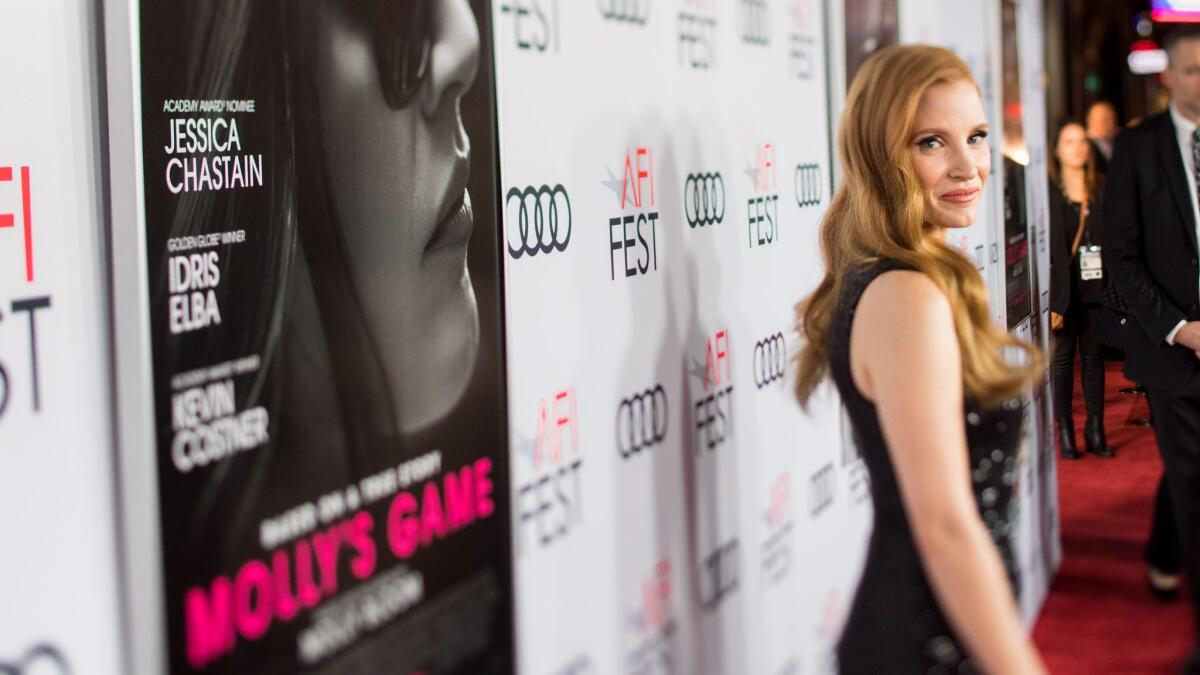
“It’s not losing, it’s actually celebrating how I feel about you and who you are,” said Chastain, who wed her husband at his family’s 17th-century Italian estate in June. “It’s a beautiful thing. So I’ve loved being married.”
While she’s becoming more comfortable being a “wife,” she’s still uneasy about being labeled one of Hollywood’s foremost defenders of women.
“I don’t want to be,” she said, shaking her head. “Well, it’s not that I don’t want to be, but I don’t want it to be about me. I want it to be about them. I didn’t do anything. What I’ve done is so small.
“I may never work again with so-and-so who’s mad at me. I may not work with people who have issues with the way I am amplifying the voices of victims, and that’s fine with me. But I’m going to work with people coming forward with whom I share similar points of view.”
Follow me on Twitter @AmyKinLA
More to Read
Only good movies
Get the Indie Focus newsletter, Mark Olsen's weekly guide to the world of cinema.
You may occasionally receive promotional content from the Los Angeles Times.


